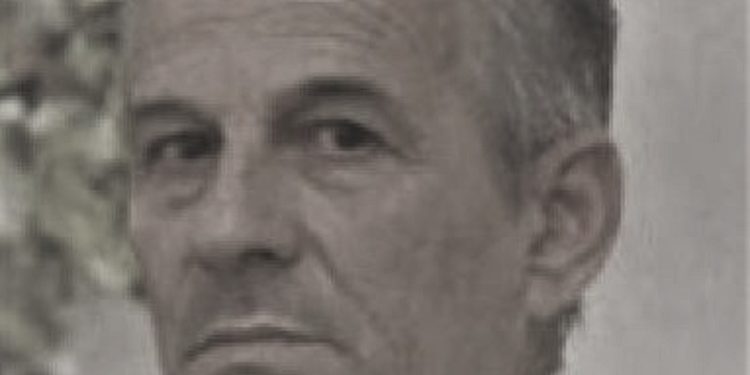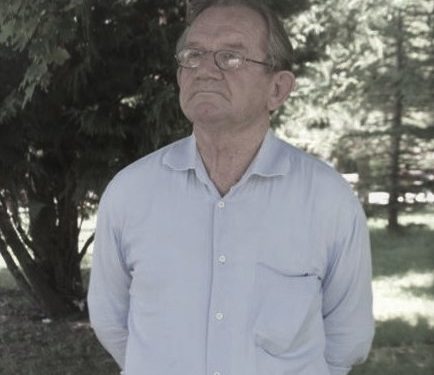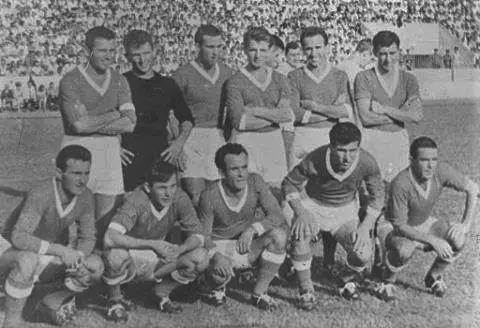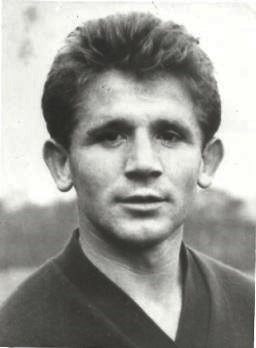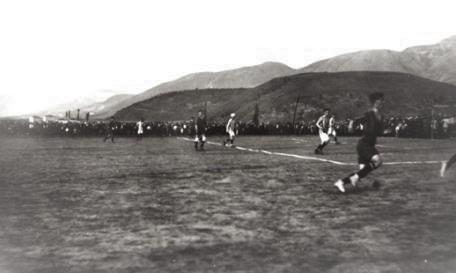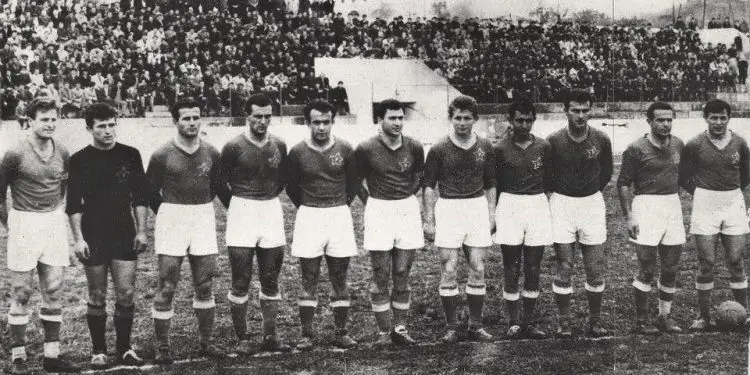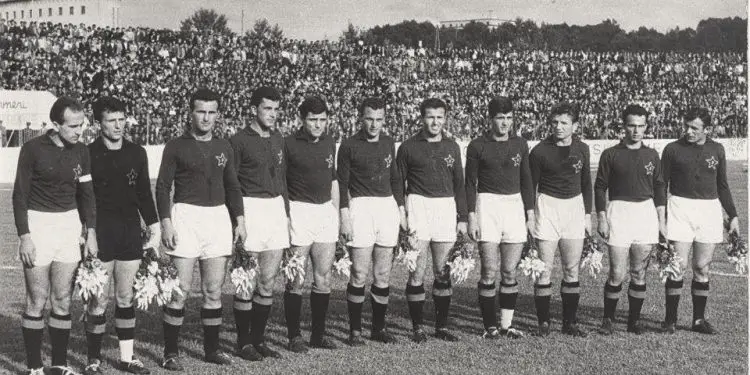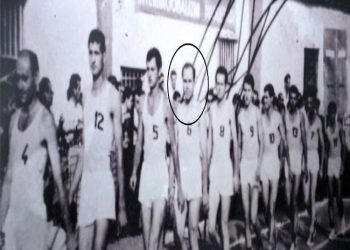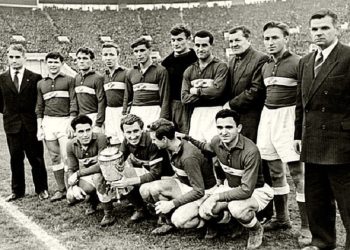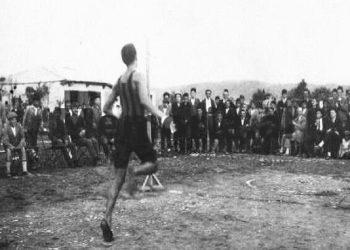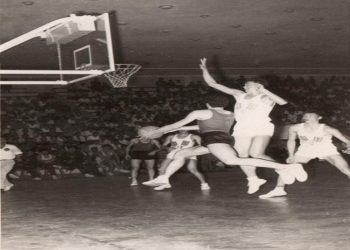From Vepror Hasani
Part four
Memorie.al / We had let him meet in one of the bars in Korça. I saw that he was coming with his “Cadillac”, (that’s what he called the bike), which he goes out with every day…! After we ordered, the “Deserved Master of Sports”, Teodor Vaso, decorated with the “Gold Medal” – for outstanding merit in sports -, football player from 1957-1973 and coach from 1973 until today, started to tell me recounted one of his football stories: “Everything about my stay in the ‘Partizani’ team or not, was left in the hands of the generals…” he began to tell me.
Continues from last issue
The confession of the “Merited Master of Sports”, the football legend, Teodor Vaso
“I didn’t have any great friendship with them, but they knew me and I knew almost all of them. In the Club – Sport “Partizani” premises, all the generals had entered and exited, such as: Beqir Balluku, Petrit Dume, Rrahman Parllaku, Vaskë Gjino, Sejdin Avdia, Et’hem Gjinushi, Todi Naçi, Thoma Xhixho, Muharrem Kokomani, Abaz Fejzo, Qazim Kapisyzi, even in these premises I had seen some others with lower ranks, such as: Skënder Malindi, Koli Mborjen, Rustem Peçin, etc.
Precisely at this time, at the end of the 1964-’65 championship, the Secretariat of the Central Committee of the ALP requested to implement the sports law: all soldier football players, upon completion of the mandatory military service, had to return to their homeland for played with the teams of their cities.
This decision no longer allowed the two military clubs “Partizani” and “Dinamo” to keep sportsmen and soldiers from the districts. The privilege that the two military teams had until then had already ended. I also had to return to Korça. Not that I didn’t want to return to my native country, but the desire to stay in Tirana was conditioned by other non-sporting issues.
I wanted to finish my university studies in Tirana. I had also made friends with my friends, with the coaches, with Tirana and with everything else that this city offered me. When I heard the news, I don’t know why I felt sorry. Of course, I loved my birthplace, Korça, but Tirana was becoming my life.
However, I hoped that one of the generals would help me stay in the “Partizan” team. I had the greatest hopes for Mihallq Ziçishti, because he was originally from the Korça region, but also for Beqir Balluku, because he seemed to me to be a man with a big heart.
At that time I thought that all the generals loved each other like brothers, but later I would learn that the truth had not been like that for everyone, the differences, especially the sports ones, existed between the two ministries, that of Defense and the Ministry of the Interior”.
Decision
“The days began to pass one after the other, while I waited to see what would happen…! I felt some anxiety. I had started looking for an opportunity to meet with a general, but I still couldn’t. Even the leaders of the team had promised me that they would allow me a meeting with them, but the occasion did not come. Anyway, one day came and the meeting happened. In those days, only the decision was talked about.
There were those who called the Secretariat’s decision of epochal value, as there were others who remained silent. In such cases, the key to enter the interior of the events was always missing. Immediately after the decision was issued, “Partizani” hurried to form the football commission, with people from civil society.
Peti Shamblli, Minister of Agriculture, was elected chairman; the place of the vice president was taken by the Chairman of the Executive Committee of Durrës; the members of the commission were well-known personalities of the society, coming from different fields. The departure of the military athletes was expected. After that, “Partizan” would have to think about the production of players.
All the country’s teams would be placed in the competition on equal terms with the two military teams “Partizanin” and “Dinamon”. At that time, the fighting echelons of “Partizani” were also formed with the participation of 6 players from the team of the Albanian football representative.
This composition of numbers was seen when playing in Belfast with the Northern Ireland team: Mikel Janku, Fatbardh Deliallisi, Lin Shllaku, Panajot Pano, Ramazan Rragami, Robert Jashari were from “Partizan”; Skënder Halili, Fatmir Frashëri, Aali Mema, Pavllo Bukoviku, from “17 November”, while Thoma Duro was from “Dinamo”. The contingent of the game included me and Foto Andoni from “Partizan” as well as Mehdi Bushati, Din Zhega, Jani Rama from “Dinamo”; Gëzim Kasmi and Niko Xhaçka of “November 17”.
In 1964, Coach Zyber Konçi, in the match against the Algerian national team, activated 7 players of “Partizan”. The match ended with the score 1-1. In addition to the 6 starting players of the national team that I mentioned above, “Partizan” also had a 7th player, Mejit Haxhiu, who was not allowed to play abroad for political reasons.
Already with the departure of some players, “Partizani” would be in an even more difficult situation, because this was happening right now, when the team was facing some problems, especially in defense. All these gave me hope that I could stay in the “Partizan” team. Even the generals were not interested in the departure of the main football players. At least that’s what I thought.”
District players
“Those who felt the most relieved by the decision of the Secretariat of the Central Committee of the PPSh, were the district teams. They hoped a lot. Until then, the champion team was sometimes announced as “Partizani” and sometimes as “Dinamo”. In general, this happened; the champion team activated the largest number of players in the national team. There were many difficulties for the football players of the districts.
The players of the capital’s teams changed places in the Albanian representative team. Sometime later, they would take players from “Vllaznia” as representatives, while decades later it would be the turn of the Vlora team. More than 300 football players from 10 other teams remained out of sight. At the end of each championship, they took the psychological hit as neglected athletes.
They did not feel good either morally or psychologically. Gradually their desire for rivalry and quality waned. Every one of them knew how much effort and struggle was needed to get a place in the national team. The “law” was always made by the club pressure of the capital. From time to time, there were attempts to look for a player from the districts, but every such initiative ended with some superficial activation.
Until then, the district teams had found it impossible to compete with the military teams, which gathered the country’s best athletes. Now I also had to return to my hometown…”!, remembers with nostalgia, “Honored Master of Sports” Todo Vaso.
“November 17” in Tirana
“I still hadn’t been able to ask for the help of any general to keep me with “Partizan”, I didn’t even know that Mihallaq Ziçishti would brag about the trophy that Enver Hoxha had given him. That man would change the direction of my career…! Every time I was alone, I thought how the moment came when the Secretariat of the Central Committee demanded the implementation of such a decision?!
Everything had happened because of new concepts that had become part of the state’s mentality. In 1965, the “17 November” team was declared champion, dethroning “Partizan”. He had not received this title since 1937. The victory of “November 17” showed that sports quality could be achieved even by non-military clubs.
The very fact that in two years, in 1965 and 1966, “Partizani” was ranked second clearly showed that other teams also had opportunities. The victory of “November 17” was not accidental: Xhavit Demneri, Osman Caslli, Haxhi Arbana, Xike Bulku, had long established the “new football factory” in Tirana. They became an inexhaustible source of quality for Tirana’s soccer generations.
In the field of “Work”, in the premises of Tirana’s schools, champion talents emerged. The youth of “Tirana” together with usta Xhavit Demner, remained champions for 5 years. From the Palace of Pioneers with Coach Osman Casllin, “November 17” brought out Skënder Halil, Fatmir Frashëri, Ali Mema, Gëzim Kasmi, Luigj Bytyçin, Pavllo Bukovik, Skënder Hykë, Niko Xhaçka, Bari Ishka and then Perikli Dhales, Petrit Dibra in front of the sports fans. , Millan Baçin, Luan Zenglen, Arben Çelën. Sulejman Memën, Aarben Mingën, Agustin Kolaën, etc.
On the professional level, “17 November” was evaluated as a team with harmonized functions. Fekste was the last echelon of the defense with a unique block of hers: F. Frashërin, S. Halil and G. Kasmin. “November 17” had already become the “locomotive” of Albanian football. Against this team in “Partizani”, the individual capacities of its players prevailed, led by the phenomenon, striker Panajot Pano.
With the national team, “Partizani” had double the number of players that “17 November” had. In the first phase of the 1965-’66 championship, “Partizani” achieved a record result: 10 wins and a draw without any losses in 11 games. Out of 22 possible points, only 1 point was lost. They were followed by “17 November” with 17 points and “Dinamo” with 15 points.
On March 13, 1966, he won the Republic Cup with two victories against “Vllaznia”, one 2-1 and the other 4-3. “Partizani” was trying to take the chair of the head of Albanian football, which he lost after the championship of 1963-’64, but now he was facing problems…”!
General Mihallaq Ziçishti
“Days passed and I still hoped for Mihallaq Ziçishti. For the first time I had seen that man by chance in the tourism restaurant in Pogradec. Dressed in a general’s uniform, Mihallaq Ziçishti looked elegant, standing in front of the buffet bar and talking to two men. He had the appearance of a charming and cheerful man, attracting attention.
“Who is this general”? – I asked Mikel Jankun, one of our officers. I had never seen him in military uniform. “Llaqi, – answered Janku, that’s how they call their friend Mihallaq Ziçishti for short, he is the Deputy Minister of Internal Affairs. You got it from Korça”, Janku, our “Partizan” goalkeeper, explained to me at that very moment.
Maybe because he left an impression on me as a good person, I was hoping for a meeting with him. I thought it would help me. He already held the position of First Secretary of the Party Committee in Korça. Meanwhile, the coaches of “Partizan” were doing their best to consolidate the defense, but they were not able to solve this situation. Often where there were problems they took me.
On 07.04.1964, in the match with Durrës, which ended with the result 1-1, I was given the role of right defender. R. Njjela wrote about this match in the newspaper “Sporti vulsi”: “The locals want to score the winning goal at all costs and for this purpose they worked more on the right side of the defense. There they found determined resistance from Vaso, who stood out for his well-measured interventions”.
On 23.02.1965, in the match “Partizani” – “Tractor”, I was assigned the role of left defender. S. Tole in “Popular Sport” wrote: “All in all, Janku received the ball twice and then stood as a spectator. Vaso was more confident in his interventions than Papadhopuli and Deliallisi”. On 09.02. 1965, in the match “Partizani” – “November 17” that ended with the result 0-1, I was given the role of central defender.
“Sporti Popullor”, emphasized: “Even the goal could have been avoided with greater care on the part of Ding and Janku. Vaso, in the role of central defender, played well, especially in the first half”. So there were reasons for me to stay in the “Partizani” team. However, what was happening was difficult to understand”
The wonder…?!
“In the middle of November, on dt. 16.11.1965, we left to play the penultimate match of the first stage in Kavaje. We had played 9 games and won 9. Partizan’s headquarters, which had burned in the previous championship in the fight for the championship title, did not give up anymore. Intervene again to elicit the most effective protection. As before the Cologne game, the same formula was repeated: I was taken out of the full-back role and put in the center.
A season ago “Besa” had scored 33 goals or 2 goals more than “Partizani”. This capacity jeopardized the success of the match. As usual, Mikel Janku would defend the goal. Personally, playing in the center of defense engaged me in many actions, tested me in difficult situations to highlight my skills. Surrounded by a defensive frame of players, where it was extraordinary to find a thread of emptiness, the attack of “Besa” could not break through to get into scoring positions.
We played confidently in defense with a controlled game in all links and team reports. This game situation prevailed until near the end of the first half. Just at this time, a vertical pass was made, in the corridor between the right wing and our center. I turned my head to the side, saw that the ball ended up at the feet of striker Agim Dizdari.
I put my hand up because he was offside, very visible. The attacker of Kavaja was 4-5 meters behind the back of our defense. Totally unhindered no.10, Agim Dizdari, released the ball forward, but did not get close to the goal. Suddenly he hit it and scored the goal. The score was 0-0.
Surprisingly no one reacted. It seemed a strange situation. The lack of reaction implied tacit approval. Besa’s goal that got us a point seemed like we conceded it by accident. In the second half of the game, the situation presented a loose confrontation; the danger was not visible in any of the gates of the field.
When every picture showed a friendly game, all of a sudden, our striker Robert Jashari sent the ball into Kavaja’s net that tied the score. A game that passed like a dream was archived in history. In this match, the first crack of the title war of “Partizani” was marked. This match was warning something…! After Kavaja, the last game remained against Tomori. We won it 2-1″. Memorie.al
The next issue follows




